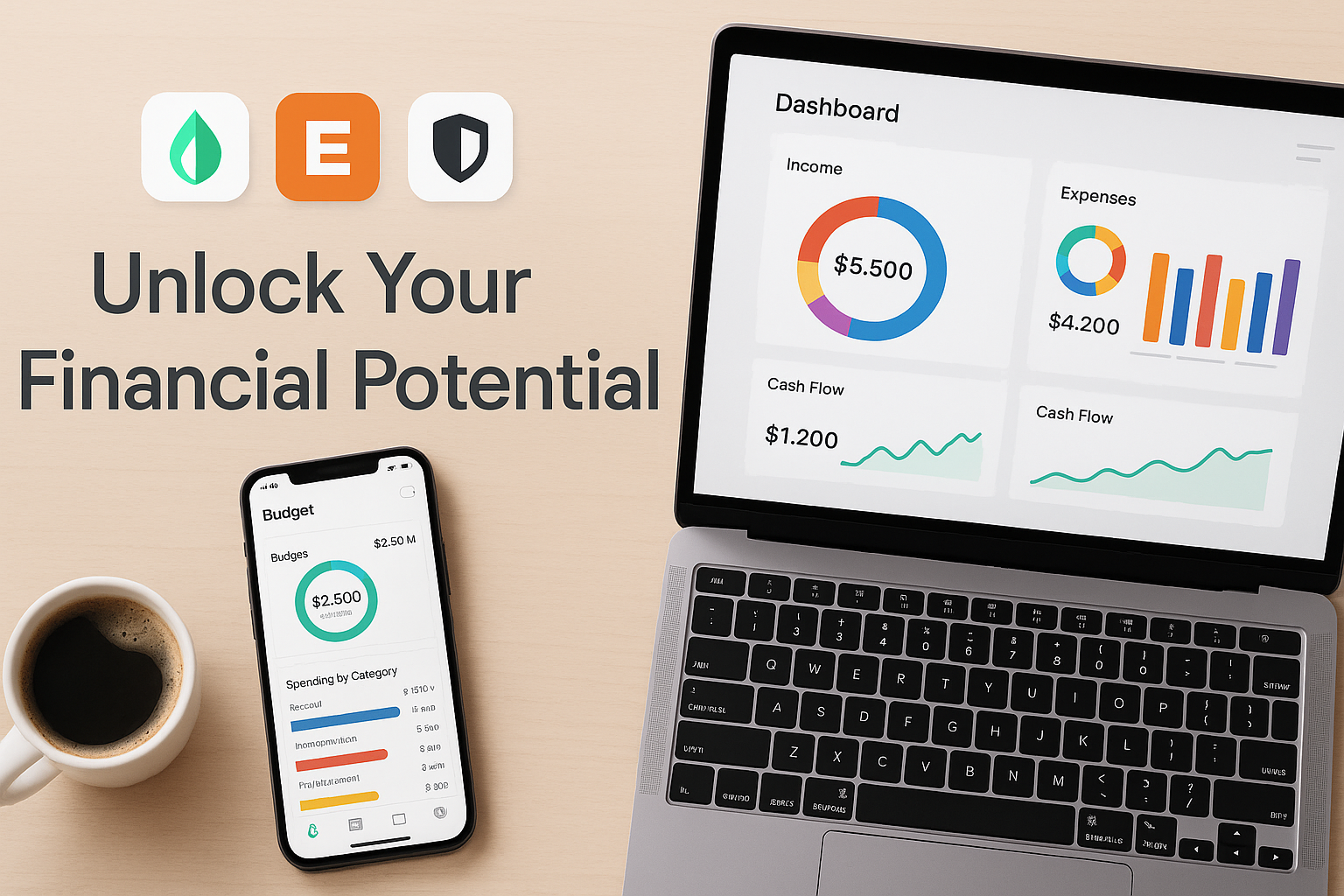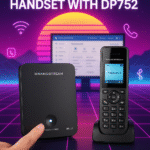Introduction: Why Financial Freedom Starts with the Right Tools
We all want to have more control over our money not only to cover our bills but also to create something better. Perhaps it is that long-awaited vacation, paying off debt or just not panicking when you check your bank account.
The good news is. You do not have to employ a financial expert or pay hundreds of dollars on a sophisticated program. There is a range of the best free personal finance software that can help you to develop your financial potential today and pay nothing.
These super tools will provide you with budgeting and expense tracking, goal setting and investment insight (and they are free!). If you are a first-time money manager or simply hate having to tinker with spreadsheets, the best free personal finance apps can make your experience easier and even wiser.
This guide will take you through the best free budgeting tools in 2025, demonstrate how they work, and assist you in determining the right tool that suits your needs. Since when your money is transparent, the future is achievable.
What Features Should Free Personal Finance Software Offer?
The amount of personal finance software available on the market is enormous, and it is easy to feel overwhelmed when it comes to selecting the correct one. However, there is nothing to be concerned about because the most effective tools usually have some common strong features which help to make budgeting and tracking of finances easier, quicker and even enjoyable.
The following are the three things to consider when you really want to unleash your financial potential:
Auto Account Replication
No more manual entries? The best budgeting tools keep up to date with your bank accounts and credit cards. This implies that your transactions are reflected in real-time, and you have a real-time view of your finances.
FAQ: Is it possible to connect free apps to my bank?
Yes. The trustworthy applications have bank-level encryption and safe APIs to secure your information. Later in the article we will discuss more safety.
Classification of Spending
Intelligent grouping will allow you to see where your money is spent, literally, whether it be on groceries and rent or late-night takeout. Even lots of applications allow you to create your own categories in your lifestyle.
Goal Setting & Budget Warnings
The best free personal finance apps are not only the ones that keep track of how much you spend but also keep you on budget and toward your goals. Save up to buy a car or create an emergency fund, alerts can remind you when you have gone off track.
Security & Data Privacy
Whenever possible, you should prefer software with secure log-in (such as 2FA), encrypted data storage, and clear privacy policies. Your money information must be as secure as your web banking.
Mobile Connection & Multi-Device Compatibility
Your cash goes where you go, and your software should follow. Seek out apps that are compatible with phones, tablets, and computers to make it possible to check-in at anytime and anywhere.
Top Free Personal Finance Software to Unlock Your Financial Potential
So, what are these tools that are assisting thousands of people to manage their money smarter and without spending a penny? This best free personal finance software should be of real value whether you aim to keep track of spending, lower debt, increase savings or plan on investment.
All the tools have their advantages, and we are going to discuss them to assist you in making the right choice.
1. Mint- One Stop Shop Budgeting
Recommended to: Novices, who prefer simple and automated process
The reason why it is great:
- Auto-syncs with your bank, credit cards and bills
- Monitors real time spending and classify transactions
- Provides individual budgeting advice
- Has credit score tracking
2. Empower (previously Personal Capital) – Budgeting + Investment in a Single Place
Most suited to: Investors who are interested in long-term financial development
The reason why it is great:
- Great in monitoring net worth and investments
- Deconstructs retirement and asset allocation
- Also does the daily budgeting and expenses
Did You Know? Empower is not a budget app, but a wealth-building tool, which means you can use it to tap into your financial potential in one of the smartest ways.
3. Goodbudget Digital Envelope Budgeting
Most suitable to: Individuals who prefer practical control
Why it is great:
- It was founded on the envelope approach which is to allocate money to areas before you use it
- No bank syncing = complete manual input (some consider this to be an advantage)
- Joint budget excellent when it comes to couples and families
FAQ: Is automatic better than manual budgeting?
In case you are interested in being hyper-conscious of spending patterns, manual entry can indeed be of assistance in developing a higher level of discipline.
4. PocketGuard -What is safe to spend
Most suitable: Simplicity and being within limits
What makes it so good:
- Extends to you how much money you can safely spend after bills and savings
- Subscriptions of tracks to prevent latent fees
- Clear, new user-friendly interface
5. GnuCash – Open-Source Desktop Power
Recommended to: Pros and privacy-conscious people
What makes it so good:
- The system of double-entry accounting (as in a small business ledger)
- Operates offline no data synchronization is needed
- It is very configurable, and completely free
FAQ: Does personal finance software require an internet connection?
Well, yes, there are programs such as GnuCash and HomeBank, which provide complete offline control, which is great if you care about the privacy of your data.
6. Money Manager EX / HomeBank – Liteweight and Offline
Best suited to: No bells and whistles tracking
The reason it is so good:
- Simple expense/income monitoring
- Clear desktop interface
- Does not have to be synchronized with bank accounts
Which Free Tool Is Really the Best? Side-by-Side Snapshot
There are so many good ones, so you may still be wondering:
So, what is the best personal finance software?
The question is what your financial style is, what you want your money to do, and how you want to get involved. To make it easier to choose, here is a comparison table of the best free budgeting software we have seen above.
Personal Finance Software Comparison Table
| Tool | Best For | Bank Sync | Budgeting Style | Investment Tracking | Platform | Data Privacy |
| Mint | Beginners | ✅ Yes | Auto-categorized | ❌ No | Web, Mobile | Medium |
| Empower | Budget + Investment combo | ✅ Yes | Auto + manual | ✅ Yes | Web, Mobile | High |
| Goodbudget | Manual control + couples | ❌ No | Envelope-style | ❌ No | Web, Mobile | High |
| PocketGuard | Overspending prevention | ✅ Yes | Safe-to-spend alerts | ❌ No | Web, Mobile | Medium |
| GnuCash | Advanced users + offline use | ❌ No | Manual + accounting | ✅ Yes (basic) | Desktop only | Very High |
| Money Manager EX / HomeBank | Simplicity + privacy | ❌ No | Manual tracking | ❌ No | Desktop only | Very High |
FAQ: Will I be able to change the tool later without losing all my data?
Yes. Most of the free personal finance software allows export (CSV, QIF), so you can port your data in case you switch tools in the future.
Are Free Budgeting Tools Safe to Use?
As far as money is concerned, security is a natural concern. The reason why many users are afraid of using free personal finance software is one question only:
Will connecting my bank account to a budgeting app be safe?
Most of the Trustworthy Apps Apply Bank-Level Security
The best applications, such as Mint, Empower, and PocketGuard also encrypt with the same level of security your bank does, usually 256-bit SSL encryption. They do so via secure APIs (not direct log in), so your real credentials are never stored, or exposed.
With a fair degree of predictability, you can anticipate:
- Two-factor authentication (2FA) of logins
- Idle logout Automatic logout is a feature that logs off a user after a period of idleness.
- Access is read only, so apps cannot move your money, but only read it
FAQ: What happens when I do not want to connect to my bank altogether?
No problem. Such programs as Goodbudget, GnuCash, and Money Manager EX allow you to enter everything manually and work 100% offline.
Intelligent Privacy Advice to App Users
It is prudent to be cautious even with safe software:
- Write a powerful password
- Enable 2FA wherever possible
- Keep up with the authorization settings
- Avoid programs that demand an excessive access to them
Open-Source vs. Commercial Who can you trust?
In case data privacy is your No,1 priority then you can consider open-source programs such as GnuCash or HomeBank. These apps do not sell advertisements or stalk you; they simply assist you in managing your money, that is all.
Bottom Line:
Most free budgeting tools are safe to use by an ordinary user, particularly those developed by well-known companies or providing bank-level security. However, offline apps are also a great choice, especially when you are privacy-first or retro.
Ready to Take Control? Step-by-Step Action Plan
Hopefully, you have been able to find the best free personal finance software to use and now it is time to stop browsing and start creating a more successful financial life.
The following step-by-step guide is simple to follow, so that you can get started and see the results even as a beginner.
Step 1: Select the Right Tool to You
Consider what you want:
- Automation and an easy sync? Mint or Empower
- Want to have total control and privacy? Goodbudget or GnuCash
- Looking at something more visual and easier? Use PocketGuard or Money Manager EX
Step 2: Create your Accounts / Categories
After you have selected a tool:
- Link your accounts (or manually add balances)
- Make categories of how you spend your money such as groceries, rent, savings etc.
- Check what you did last month to get to know your patterns
FAQ: What is the time frame of the setup?
Most apps need only 510 minutes to get started and you can change things on the fly.
Step 3: Make One Easy Goal
Do not attempt to change your whole life overnight. Begin with one, practical objective:
- The goal of saving 500 dollars in 3 months.
- Monitor my expenses this month
- Pay the minimum balance of my credit card
These small victories aid in creating momentum and confidence
Step 4: Review Weekly not Monthly
Install a weekly 10-minute money check-in on your phone:
- Find out where you were extravagant
- Transfer idle money to savings
- Change your budget categories when necessary
Step 5: 30 Days and Stay with It
The trick is consistency. It might be that you have a bad week, but don’t quit.
Before the first month is over:
- You will be able to see where your money is spent clearly
- You will notice wastage and hidden charges
- You will get closer to the habits that will open your financial potential in the long run
Start Now — The Tools Are Free, but the Transformation Is Priceless
You do not have to be a rich person to begin managing your money, you simply need the correct system.
Begin with a single tool. Make a single objective. And regain control of your financial future -one click, one day, one dollar at a time.
Conclusion: Your Financial Growth Starts with One Download
Financial advice is not in short supply, but until you do something, the change will not come.
The tools that we discussed are not mere apps, but rather facilitators of clarity, control, and confidence of money. Regardless of whether you are saving up to your future, crawling out of debt, or just trying to avoid feeling like a nervous wreck whenever you look at your bank account, a good tool can make a significant difference.
And the most interesting thing is that? It does not cost a penny to get started.
Pick the best free personal finance software out of the above list and use it 30 days, and you will be amazed that some small steps can open up your financial possibilities.
Future you will appreciate it.



